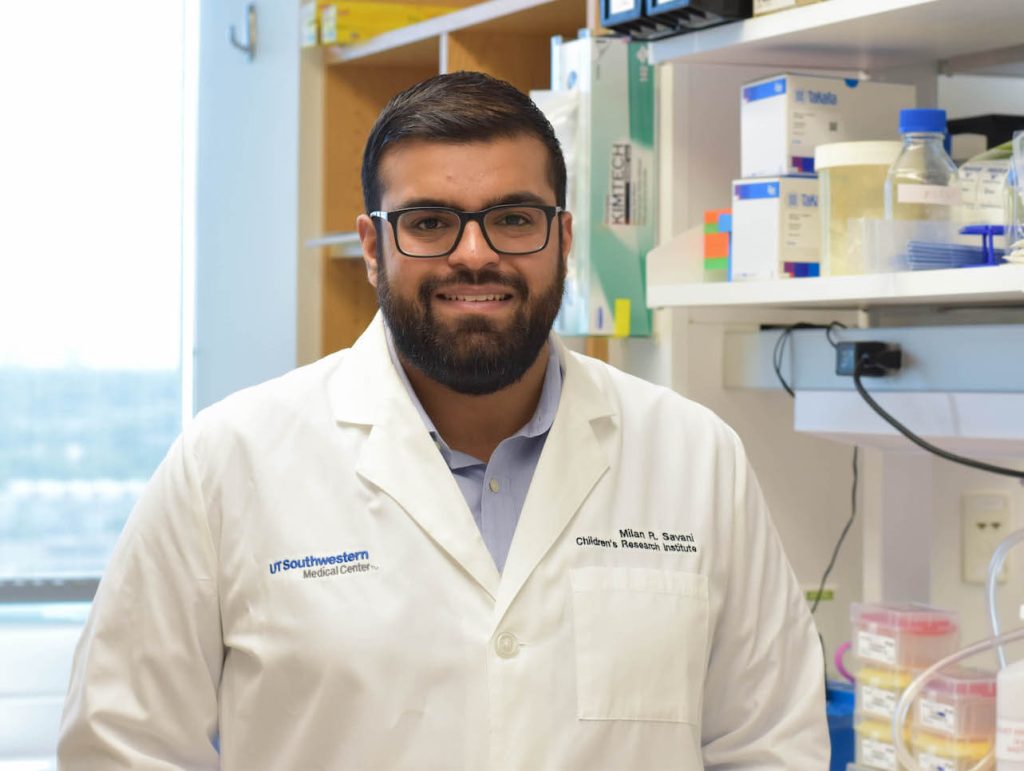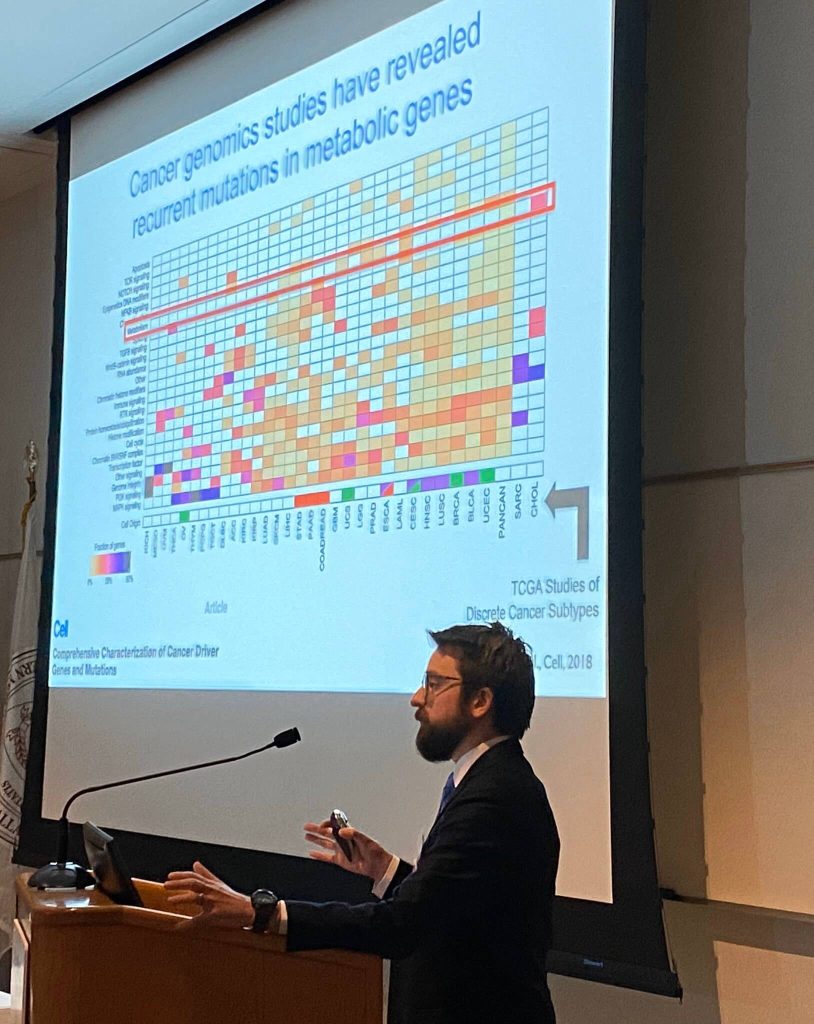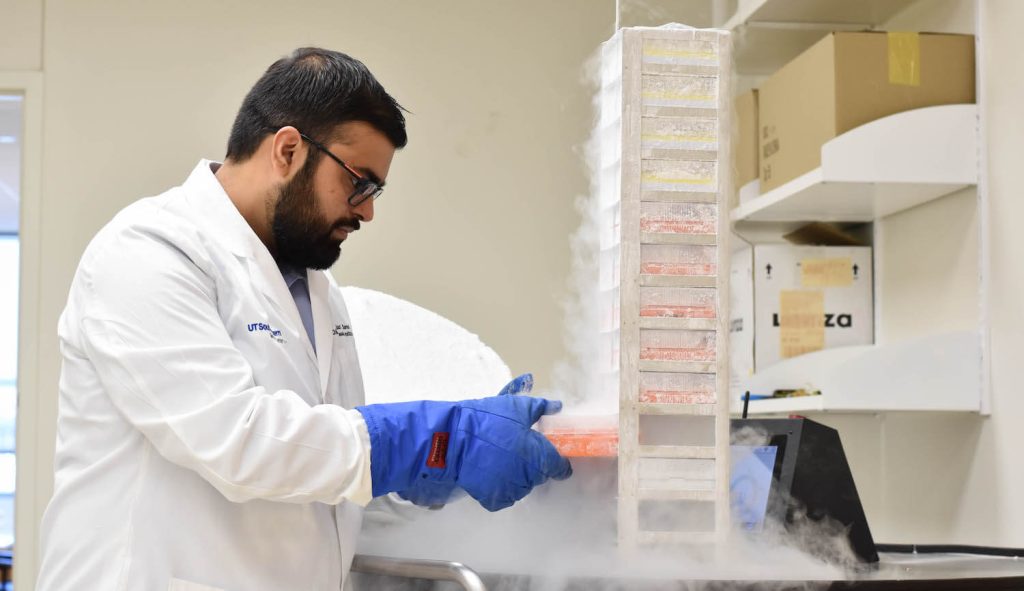May 17, 2022
Milan Savani is an M.D./Ph.D. student in the Medical Scientist Training Program (MSTP) at UT Southwestern. In the McBrayer lab in CRI, he studies how brain cancer cells use nutrients differently than their healthy counterparts, focusing primarily on metabolic fuels that contain the element nitrogen.
What are you researching?
The treatment for glioma, the most common type of brain tumor, has not changed in more than 20 years. A significant portion of gliomas are driven and initiated by mutations that affect isocitrate dehydrogenase (IDH) genes. Our laboratory discovered that IDH1 mutant glioma cells are hypersensitive to drugs targeting enzymes in the de novo pyrimidine nucleotide synthesis pathway. This pathway is one of the main routes cells use to make the building blocks of DNA and is vital for cell growth and proliferation. I am studying why these tumor cells become dependent on the de novo pyrimidine synthesis pathway, with the goal of developing targeted therapies for these deadly brain tumors.
To approach this and related questions, I have been working to develop a new technology that will allow us to comprehensively profile the levels and usage of metabolic fuels that contain the element nitrogen. This will help us uncover important differences between cancer cells and healthy tissue, painting a picture of the complex network of chemical reactions taking place. These studies are made possible through the unique environment at the CRI and close collaborations with the CRI Metabolomics Facility. Using the rich datasets that we can obtain from these experiments, I hope to unravel cellular changes that can both push cells to become cancerous and make these cells vulnerable to therapy.


Why did you choose CRI?
When I was first considering coming to UT Southwestern for M.D./Ph.D. training, I was excited at the prospect of completing a laboratory rotation in CRI. Its breadth and depth of expertise and its collaborative environment to perform impactful scientific research excited me. As I completed the first two years of medical school, I had the opportunity to co-organize the MSTP’s weekly Works in Progress Seminars, which allow students to hear from faculty members about research projects and opportunities in their laboratories. Dr. Ralph DeBerardinis, who now chairs my thesis committee, suggested inviting Dr. Sam McBrayer, then a new member of the CRI faculty, to speak.
He shared a tour-de-force talk highlighting research performed during his postdoctoral fellowship and opportunities for students in his lab. After hearing this talk, I was excited to join the laboratory for a rotation after completing my first clinical clerkships of medical school. During the rotation, I was struck by the excellent mentorship in CRI, the unique opportunities to pursue disease-focused basic scientific inquiry, and my colleagues’ appetite to collaborate and lend a helping hand.
What would you be if you were not a scientist?
I would have loved to become a professional chef. I love cooking at home, and I’ve always been fascinated by the restaurant industry, the food scene in the cities I’ve lived in, and sharing a great meal with others. Most recently, I’ve gotten into homemade pizza. There was a time when I was making two unique pizzas every weekend, ranging from the classic Margherita (top left) to one with chorizo, queso Oaxaca, poblano peppers, charred onions, avocado, and a lime crema (bottom right).


What’s your favorite spot in CRI?
My favorite spot is the end of the lab bay where my benchtop is located. It’s where my desk and the desk of my close colleague in the laboratory, fellow M.D./Ph.D. student Alex Sternisha, are both located. We have a fun, supportive environment in CRI and in the McBrayer lab. Every day my colleagues remind me how lucky I am to work here.
Tell us about your pets.
My parents live nearby in Dallas and have three dogs: Teddy (middle), Ollie (left), and Ruby (right). They’re goldendoodles and are full of personality! I try to make it over to see them as often as I can.

© 2025 Children’s Research Institute Dallas Texas | Privacy | Site Policies